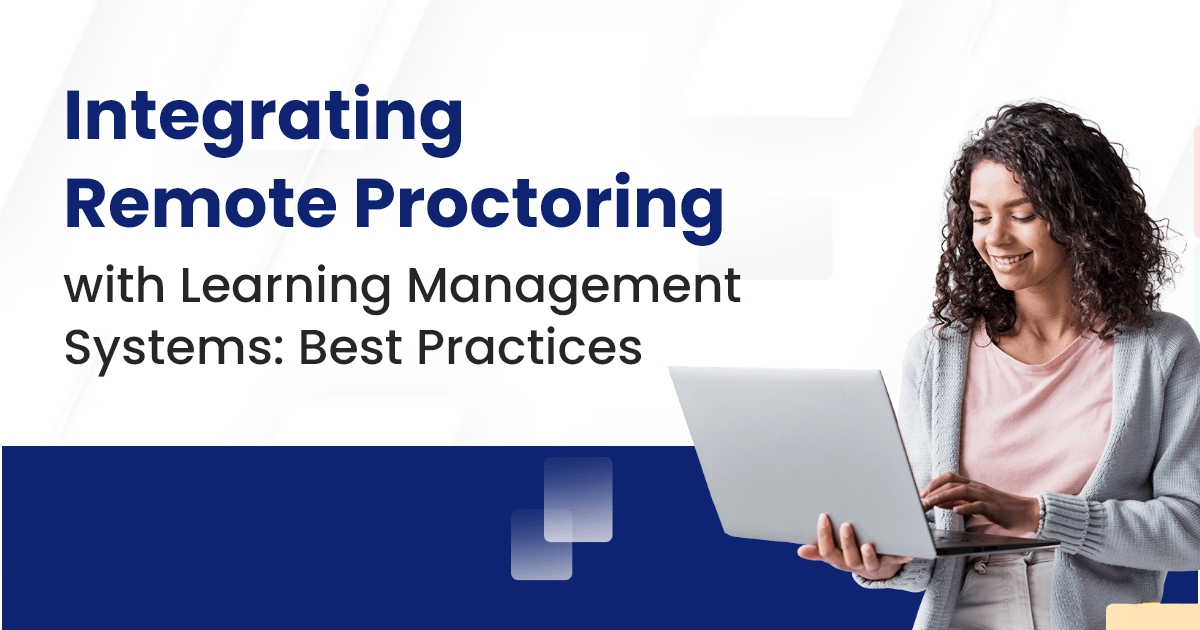The pandemic pushed online learning further ahead and, thus, an increased importance towards blended assessments came up. Remote proctoring, combined with learning management systems (LMS), promoted best practice for educational institutions and organisations keen to maintain the integrity of online examinations. This blog elaborates on the pros and best practices of remote proctoring solutions.
Understanding Remote Proctoring:
Remote proctoring is the use of technology for remote monitoring of the students during online examinations to avoid cheating and provide a fair testing platform. In distance learning, proctoring software has become the mainstay of institutions and training organisations that conduct evaluations remotely. By coupling the proctor service provider with your LMS, you can now give an assessment experience wherein all formalities will mimic those of traditional in-person assessments.
Best Practices for Integration
- Choose the Right Proctoring Tools: A respective online proctoring software should be selected, as there are different proctoring solutions with distinct features. Look for proctoring tools that are capable of fulfilling your institution’s needs and supporting seamless integration with your LMS. One such software is Think Proctor, by Think Exam, which offers a detailed suite of proctoring options to ensure exam integrity, all the while providing a seamless experience to the candidates.
- Smooth Configuration: Keep the integration as simple as possible. It is important that the chosen remote proctoring software has clear documentation and support, so that instructors find it easy to set up an exam. A user-friendly interface can make things easier for both the examiner and the candidates since it makes it easy to find one’s way through the system with very little training.
- Implement AI Proctoring Features: Advanced AI proctoring capabilities, like facial recognition and ID verification, add an essential layer of security. Think Proctor utilises these features to ensure that only authorised candidates sit for exams. By incorporating these technologies, you can significantly reduce the risk of impersonation and fraudulent conduct.
- Provide Clear Instructions: To prepare candidates for online exams, provide comprehensive guidelines detailing how to navigate the online exams software. Include instructions on how to set up their testing environment and what to expect during the proctoring process. Clear communication reduces anxiety and helps candidates feel more confident.
- Track testing sessions efficiently: Using recorded and live tracking options will improve the security of your exam. You can pass the exam right away. And there’s real-time tracking of high-stakes exams. Therefore, if suspicious activity is detected, immediate action can be taken.
- Training employees and examiners: Make sure your employees are ready to use online proctoring technology effectively. This includes training on remote proctoring tools. Learning how to perform basic troubleshooting and understanding what action to take if something goes wrong during the exam…
- Gather opinions: When you use remote proctoring it is important to gather feedback from applicants and supervisors. This will help you identify any issues or areas of improvement needed to improve the overall experience. It is important to continue to improvise to keep your assessment objective and user-friendly.
The Role of Think Remote Proctoring
Regarding the various trends and advancements made in remote proctoring, Think Proctor, an online proctoring software developed by Think Exam, easily fits the bill to the changing needs of schools, universities, governments and corporations irrespective of the region of the world. Here is how Think Proctor is changing the game in the integrity of conducting online examinations.
- Proctoring Based on CCTVs and Images: Every individual attempting the test is put on facial recognition technology that continuously scans the individual to ascertain their true identity. If anyone tries to impersonate them, they will be noticed immediately, and only those continuing the exam will be cleared.
- ID Verification Using AI: It helps in identity verification assistance pre and post examination. This element adds more confidence in the users and minimises the risk of any fraudulent activities.
- Recording Feature: This feature helps in recording the entire examination process for archival purposes. The recorded materials may be examined by interested persons such as proctors or administrators in order to find out whether there was any misconduct during the examination, hence it is suitable for examinations where real time video surveillance may not be possible.
- Live surveillance: For some high stake tests that require real time monitoring of the exams, Think Proctor offers a live proctoring service whereby a proctor is able to monitor the exam in real time over the internet. This feature allows for immediate action in case the proctor spots any misconduct during the examination.
With the help of Think Proctor, these entities can easily adapt from the traditional methods of evaluations which involve sitting for examinations to an online approach. This is made possible without losing the efficiency and effectiveness of the examination process. Forget about exams, Think Proctor includes an intuitive interface and AI-focused devices so that candidates do not feel they are in a tense environment, but rather one where they can concentrate on an examination while all stern conditions are in place.
Conclusion
This will help in the deterrence of malpractices during online assessments. The online exam can be achieved without any compromise on security and practice principles by the education sector and the corporations by applying best practices and other measure. Make the future of examinations yours by embedding services for remote proctoring in your Learning management System in no time!








